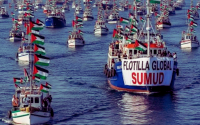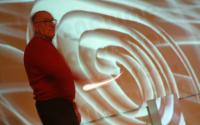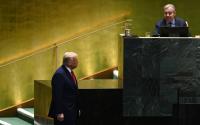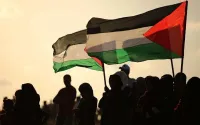19 November 2005Kim Sengupta
The bomb exploded at 8.25 in the morning. The noise was terrifying. I was lying in bed reading when the first blast sprayed slivers of glass across the room.
It was quickly followed by another, even louder, blast, this time sending chunks of the wall and the window frame hurtling into a heavy, 12ft wardrobe. It tottered towards the bed, and then collapsed in on itself like a cardboard pantomime prop.
The room was wrecked but all I had were cuts and bruises. Staying in bed a little longer than usual had saved me from serious harm.
Outside the hotel, the Iraqis, without the protection of a blast wall, had no such luck. All around was wild gunfire, which seems to follow all bombings. That and the wailing and screaming of women and children. A row of houses had collapsed, others were on fire. The bombing at the Hamra hotel in Baghdad killed eight people, two of them children, and injured about 60 others. Many of them are not expected to survive. More people were buried under the smouldering ruins of what had been their homes.
On an exceptionally bloody day, even by the standards of this savage conflict, there was even greater carnage elsewhere.
Two suicide bombers killed 74 people gathered for Friday prayers at two Shia mosques in Khanquin, in the north-eastern Kurdish part of the country, which had thus far escaped the worst of the violence so far.
Ali Abdullah was bowing his head in worship as a bomb went off. "I had seen the two men come in, they walked into the middle of everyone and then blew themselves up. The roof fell in on us. You can see flesh on the walls of the mosque, a holy place."
Kamaran Ahmaed, the director of the Khanaquin hospital, said: "Apart from the dead, there are about 150 injured. I fear the number of dead is going to rise."
The attack at the Hamra was also carried out by two suicide bombers, using a van and a flatbed truck, packed with plastic explosives. It was markedly similar to another bombing on the Palestine hotel, which is also used by the international media.
The Hamra is in the Jadriyah district, just 200 metres from the interior ministry bunker where 169 tortured and starved prisoners were found a few days ago. The captives are supposed to have been held by the Shia Badr Brigades militia. The Interior Minister, Bayan Jabr, a former Badr commander, maintained that the claims of torture were exaggerated. He also said the government was in full control of security in the area.
The bombings at Khanaquin and the Hamra may have been Sunni retaliations for the bunker. But a senior American officer, said he thought it was revenge by the Shias against Western journalists at the hotel who first published the story of the prisoner abuse.
Security cameras show the lead bomber, in a light blue van, ramming the concrete blast wall in an attempt to punch a hole for the flatbed truck to follow. The concrete barriers are just 20 metres from my second-floor room, and I had often stood on the balcony with colleagues musing on what would happen if an assault came from that direction.
We found out yesterday. It seems the van leading the charge had been packed with too much explosive. It crumbled the until-now reassuringly formidable-looking walls, but also gouged out a crater so deep that the flatbed could not get through.
Some of the security guards at the hotel opened fire with their Kalashnikovs. The bomber made one more attempt to drive his way in, and then, having failed, blew himself up. The two blasts tore apart the bomb vehicles and set fire to a line of parked cars. Fountains begun to sprout from the burst water mains forming dark brown pools.
But the real damage was in the homes beyond. People crawled out of the debris with blood on their faces, often pulling injured relations behind them through the acrid smoke and the dust. The air was filled with sound of the injured moaning and the wailing of their anguished families, and all around there was the smell of burning.
An elderly woman, wearing a black abaya, sat in the mud rocking backwards and forwards and beating her temple with her fists. "The family is back there," said Rashid Saffa, 19, gesturing with his thumb towards the piles of bricks and mortar. "She cannot speak now, she is just crying. I am her grandson. My mother and father are back there, I must go back and look."
The Iraqi families living around here benefit from the Hamra's generator during the frequent power cuts in Baghdad. They also get a certain amount of protection from criminals due to the presence of the security guards hired by the hotel and the media. But having a large number of foreigners in their midst also brings danger as yesterday showed so painfully.
However, the local people are also thought to have supplied information about the torture dungeons and may have been marked out for retribution because of that - an atrocity for reporting an atrocity. "We have the hotel, yes. But they targeted Shia houses here regardless, why?" shouted Hameed Taha. "I myself pulled out a young girl from the rubble, why did they do this?"
Mohammed Yasin, 61, shook his head tiredly. "We knew about the hotel, but we chose to stay. These people just like to kill. This is Baghdad; if we don't get killed here, we die somewhere else."
Parts of the bombers' bodies were strewn around - a charred foot outside the hotel entrance, a scrap of scalp next to the swimming pool. The night manager's son had been among those killed. "He was a good, polite boy," said a colleague. "You have met him. He had no chance, the bomb went off when he was right next to the van."
The US and Iraqi forces arrived half an hour after the bombings and blew up a suspicious car. The Americans were led by Brigadier General Karl Horst, who had also led the raid on the interior ministry building. The Iraqi commander was General Adnan Thabet, whose special forces are accused of some of the worst human rights abuses.General Horst said: "If the second bomber had got through the Hamra would not be standing now."
There was an awful lot of blood on the landing and stairwell on my floor at the hotel. The only person regularly using the corridors at that time would have been the cleaner, an ever-smiling young man who would practise his English with us. We had checked whether our colleagues in the media were all right, but I had not even thought about him.
As we picked our way through the debris in search of our belongings, there was news about the bombings in Khanquin. There the searches were for bodies. As dusk fell, and the digging continued, a 12-year-old girl, Sarkhel Akram, collected Korans from the wreckage of the mosques, kissed them, and put them away.
About the same time, outside, I found Rashid Saffa returning from the Yarmuk Hospital. "My mother and father are injured, but they are alive, inshallah. They are badly hurt but they are alive," he wiped his eyes.
http://news.independent.co.uk/world/middle_east/article327983.ece






